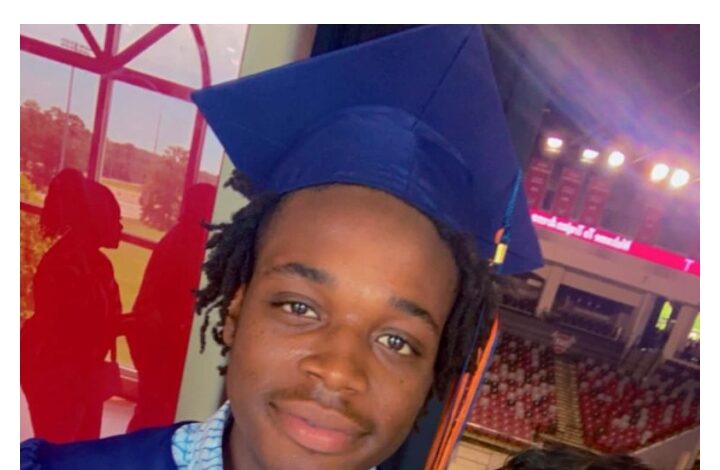
18-Year-Old Deonte Johnson Identified as Victim in Tuskegee University Shooting, Leaving 16 Others Injured Amid Homecoming Celebrations; 25-Year-Old Montgomery Man Arrested for Possession of Machine Gun with Conversion Device
18-Year-Old Deonte Johnson Identified as Victim in Tuskegee University Shooting, Leaving 16 Others Injured Amid Homecoming Celebrations; 25-Year-Old Montgomery Man Arrested for Possession of Machine Gun with Conversion Device”
1. Overview of the Tragic Event and Timeline of the Incident
In the early hours following a night filled with homecoming festivities at Alabama’s Tuskegee University, a tragedy unfolded as gunfire erupted on campus grounds, leaving a young man dead and sixteen others injured. The incident cast a dark shadow over what was intended to be a joyful reunion of alumni, students, and the local community, celebrating one of the institution’s most cherished traditions. Authorities later identified the young man fatally injured as 18-year-old Deonte Johnson. In a swift response, the Tuskegee Police Department, in coordination with federal agents and Alabama law enforcement, arrested 25-year-old Jaquez Myrick of Montgomery, Alabama, for possession of a handgun with a machine gun conversion device, a federal offense.
The altercation occurred around 11 p.m. on the university grounds, where large crowds had gathered for after-parties and gatherings, unofficially marking the culmination of homecoming weekend. Eyewitness accounts, corroborated by initial police reports, suggest that gunshots were first heard at around 11:15 p.m. within a crowded campus area. As panic set in, people fled the scene in all directions, resulting in additional injuries from trampling and individuals attempting to seek cover from the gunfire.
2. Details on the Victim and Others Injured
Deonte Johnson, the 18-year-old who lost his life in this senseless act of violence, was a recent high school graduate with aspirations to continue his education. Known among friends and family as a bright and cheerful young man, he was often described as having a heart for others and an infectious laugh that endeared him to many. On this night, Johnson had joined friends at the Tuskegee campus to participate in the lively homecoming atmosphere, an event that draws many young people, including those from surrounding communities.
The sixteen individuals injured in the hail of bullets ranged widely in age, background, and affiliation with the university. While many were students, some were visitors or alumni who had returned for the weekend’s events. Local hospitals treated various injuries, with most injuries stemming from gunfire but others from falls or being trampled in the panicked crowd. Fortunately, while some victims remain in critical condition, doctors report that they are expected to recover. Many are left traumatized, having narrowly escaped further harm in the ensuing chaos.
3. Arrest and Investigation of Jaquez Myrick
In the immediate aftermath, law enforcement officials established a perimeter and secured the area, focusing on controlling the crowd and preventing further violence. Shortly thereafter, authorities observed Jaquez Myrick, a 25-year-old man from Montgomery, attempting to leave the scene. His behavior reportedly drew suspicion, prompting officers to stop him for questioning. Upon searching Myrick, law enforcement discovered that he was in possession of a handgun modified with a machine gun conversion device.
These conversion devices, commonly known as “Glock switches” or “auto sears,” are illegal attachments that allow semiautomatic firearms to function as fully automatic weapons, enabling them to discharge multiple rounds with a single trigger pull. This modification increases the weapon’s lethality by enhancing its firing rate, making it exceedingly dangerous in a crowd setting. Federal charges were promptly filed against Myrick for possession of an unregistered machine gun, a federal offense carrying significant penalties, particularly when associated with violent incidents.
Though Myrick has been detained, authorities have not yet determined whether he was directly involved in the shooting that resulted in Johnson’s death and the injury of 16 others. His arrest, however, is a critical step in the ongoing investigation as police try to ascertain whether Myrick was acting alone, part of a larger conflict, or if there were additional individuals responsible for the shooting.
4. The Impact on the Tuskegee University Community
The shooting has sent shockwaves throughout Tuskegee University and the surrounding community. Homecoming at Tuskegee is more than just a celebratory event; it is a cultural moment, a time for students, alumni, and faculty to come together and honor the university’s history, achievements, and legacy as one of the country’s prominent historically Black colleges and universities (HBCUs).
Students, faculty, and staff have expressed a collective grief and a sense of betrayal, as this event has marred what is typically one of the most anticipated weekends of the academic year. University President Dr. Charlotte Morris issued a statement, emphasizing the university’s commitment to supporting the affected families and promising full cooperation with law enforcement to ensure that justice is served.
Dr. Morris also announced that the university would offer counseling services to students, staff, and families in need, recognizing that many witnessed or experienced the traumatic events firsthand. This incident has sparked renewed discussions on campus security measures, especially for large events such as homecoming, which draw sizable crowds and attract individuals beyond the campus community. University officials are now considering enhanced security protocols for future events, including more rigorous entry screenings, increased campus patrols, and collaboration with local law enforcement to ensure the safety of attendees.
5. Community Reactions and Calls for Change
The broader Tuskegee and Montgomery communities have been left grappling with the implications of the shooting. Advocacy groups, parents, and community leaders have voiced their concerns regarding the recurring issue of gun violence in the region, particularly involving young adults. Many are urging both state and federal lawmakers to take decisive action against the proliferation of conversion devices that can easily transform handguns into fully automatic weapons.
Local leaders, such as Tuskegee Mayor Tony Haygood and Montgomery Mayor Steven Reed, have expressed their condolences and emphasized the urgency of addressing gun violence at both a community and legislative level. Mayor Haygood called for community unity and resilience, urging local residents to come together in mourning and healing while pressing for justice for Johnson and all affected by the incident.
Activist organizations in Montgomery, including groups advocating for violence prevention and firearm regulation, have used this event as a rallying point, emphasizing the dangers of easily accessible gun modifications. These groups are advocating for heightened awareness and stringent policies against these devices, aiming to prevent such incidents in the future. Additionally, the shooting has prompted calls for educational programs in schools and communities on conflict resolution and nonviolent communication, aiming to reduce altercations that might otherwise escalate into deadly confrontations.
6. The Broader Context of Gun Violence in Alabama
The shooting at Tuskegee is a stark reminder of the ongoing gun violence issues facing Alabama and the United States as a whole. Alabama has some of the highest rates of gun violence in the country, a crisis that has prompted both state and national conversations about effective methods to curb such incidents.
Experts point to several contributing factors, including the accessibility of firearms and firearm modifications, inadequate mental health resources, and socioeconomic pressures that often exacerbate tensions within communities. Firearms with high rates of fire, particularly those altered with conversion devices like the one found in Myrick’s possession, are increasingly used in violent crimes, posing a growing threat to public safety.
In recent years, Alabama lawmakers have proposed legislation to address gun violence, though much of it has been met with considerable debate. Proposals include stricter regulations on firearm modifications, mandatory background checks, and improved mental health screenings for individuals seeking to purchase firearms. However, some of these proposals have stalled, with opponents citing Second Amendment rights as a critical concern. This latest incident may serve as a catalyst for renewed legislative efforts to address gun violence across the state.
7. Reflections on Campus Safety and National Implications
The tragedy at Tuskegee University has reignited discussions on college campus safety, particularly at HBCUs that may lack the same level of funding and resources as larger institutions for security measures. While many universities across the nation have adopted rigorous safety protocols, the unique cultural and social aspects of HBCU events, such as homecoming, often attract a wide range of visitors, presenting complex security challenges.
Experts on campus safety recommend that universities implement a range of measures, including secure entry checkpoints, advanced surveillance systems, and emergency response plans tailored for large gatherings. Some have also suggested a reevaluation of campus police training to better address incidents involving modified firearms or rapid-response scenarios for mass-casualty events.
On a national level, the Tuskegee shooting highlights the urgent need for a federal response to the issue of firearm conversion devices. While federal law prohibits the sale and possession of these devices without proper licensing, their ease of accessibility online and in some black-market circles remains problematic. National advocacy groups, like Everytown for Gun Safety, are calling for stricter enforcement of existing laws and additional legislation specifically targeting these devices.
8. Moving Forward: Memorials, Healing, and Advocacy
As the Tuskegee community mourns the loss of Deonte Johnson and supports those injured in this tragedy, plans for a memorial service have already begun to take shape. University and local leaders aim to hold a public memorial on campus to honor Johnson’s life, providing a space for family, friends, and the broader community to grieve and reflect.
In addition to the memorial, several student organizations have committed to hosting a series of forums and workshops addressing gun violence, mental health, and campus safety in the coming weeks. These events are expected to foster open dialogue, helping students process the traumatic event and work toward a safer campus environment.
Families of those affected, alongside gun control advocates, are already mobilizing to push for legislative change and increased awareness around the issue of gun violence and modification devices. By transforming grief into advocacy, they hope to ensure that incidents like this do not happen again, at Tuskegee or anywhere else.



